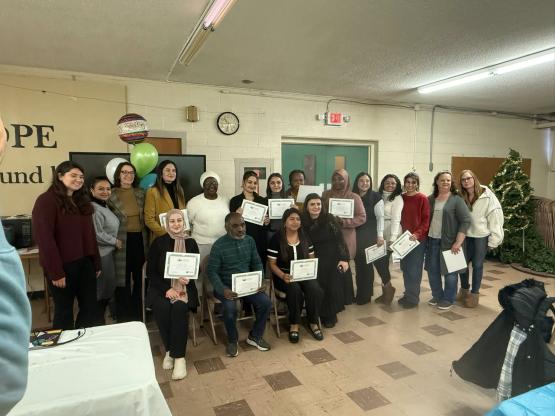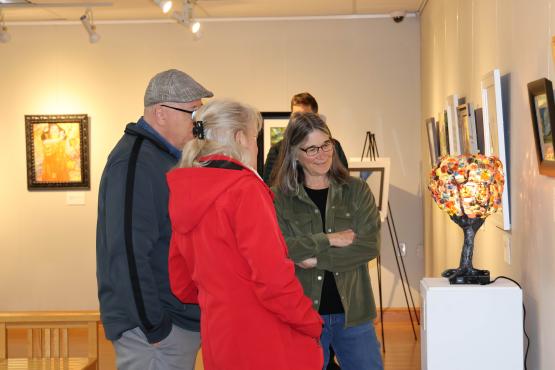
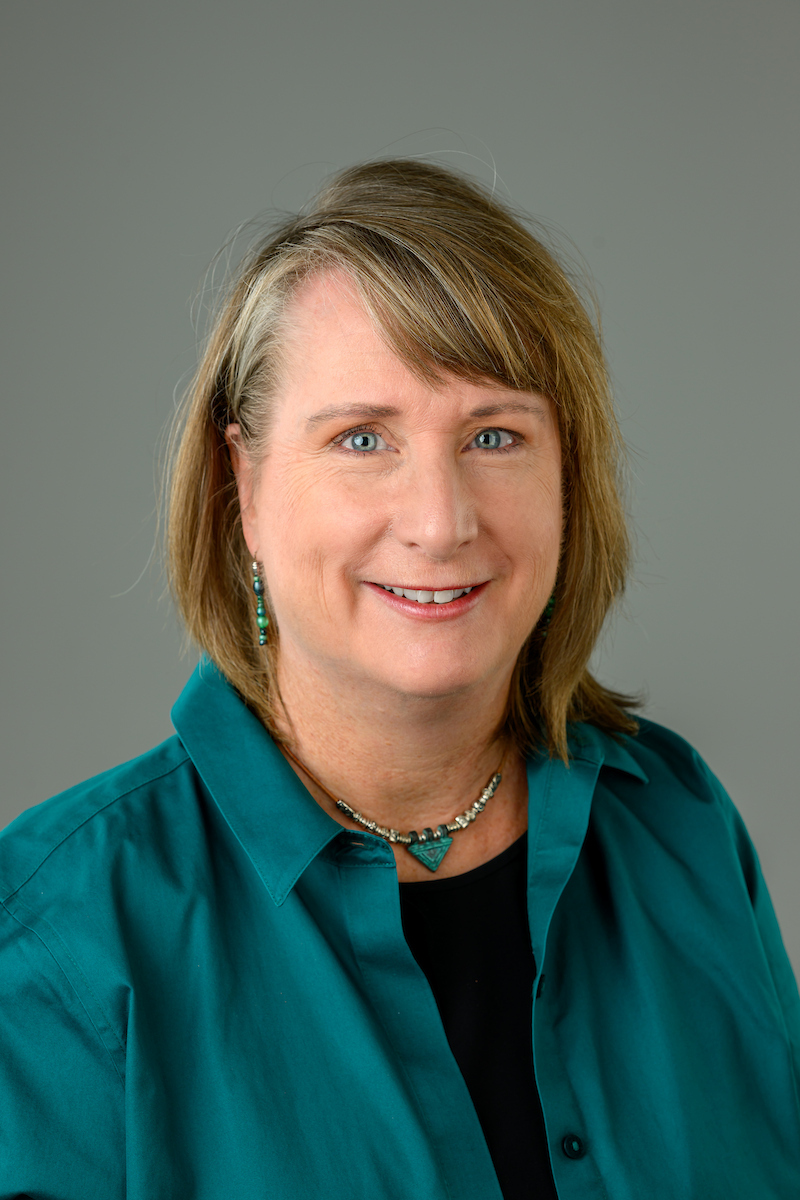
Julia Paxton to take expertise in poverty and economics into a global classroom with Fulbright Award
Professor Julia Paxton's innovative approach to community-driven education has earned her a Fulbright Award to expand her work internationally, furthering the impact in addressing global disparities, specifically in inequality and poverty.
Samantha Pelham | December 12, 2024
Share:
Julia Paxton, a professor of economics at Ohio University, has been awarded a Fulbright Global Challenges Teaching Award, a prestigious recognition that will support her ongoing efforts to address poverty and inequality through education and community-based learning. The award is designed to enhance global learning at Ohio University, and includes Gillian Ice, interim associate provost for Global Affairs, and Jeremy Henkel, from the Center for Teaching, Learning, and Assessment.
Paxton, who also serves as the undergraduate chair of the Department of Economics in the College of Arts and Sciences, is known for her innovative approach to teaching and her commitment to bridging the gap between academics in the classroom and real-world experience in the community.
“The award challenges faculty in the U.K. and the U.S. to collaborate on four different pressing social issues using Virtual Exchange /Collaborative Online International Learning (VE/COIL) techniques and I chose to apply for the award focused on inequality,” Paxton said. “With the rise of global learning, the idea is that by having two different perspectives from two different countries, students can view a local issue through a global lens.”
The award will allow Paxton to expand her work with her Economics of Poverty course, which integrates classroom learning with hands-on service projects aimed at tackling pressing issues of poverty and inequality in the local community. This class, which also serves as a C-course at Ohio University, is at the heart of Paxton’s unique approach to teaching economics.
A Global Perspective on Inequality
As part of her Fulbright Global Challenges Teaching Award, Paxton’s Economics of Poverty course will be paired with a humanities class on inequality taught by Philip McGowen at Queen’s University Belfast. The collaboration will allow students from both institutions to compare and contrast their local experiences of inequality, exploring similar themes through different cultural and disciplinary lenses.
“Our students will be exploring poverty and inequality in Appalachia while learning from their peers in Northern Ireland, who face their own set of challenges,” Paxton said. “By working together, our students will gain a broader, more nuanced understanding of what it means to be unequal in different contexts.”
The class at Queen’s University that Paxton will be partnering with uses literature and the humanities to analyze inequality, while her class focuses on economic inequality. The goal is to push the students to think critically about what it means to be unequal and how those definitions differ depending on the context, whether it's in Appalachia or Northern Ireland.
Paxton, Ice and Henkel will also have the opportunity to visit Belfast and learn more about the partner course and the types of inequality the Queen’s students are exploring. She will host a team from Queen’s University and give them a tour of Appalachia and Southeastern Ohio, as well as introduce them to community leaders and let them see firsthand the work being done to address issues of inequality in the Appalachian region.
“When I first started teaching classes on economic development and developing countries, I noticed a distinct difference in classroom participation between students who had traveled abroad and those who hadn’t,” Paxton explained. “The students with international experience were consistently raising their hands and contributing to the discussion, while others felt left out, as though they had little to offer. The class became dominated by the more experienced students, which sparked my interest in service-learning. I saw it as a great equalizer in the classroom, where all students could have the opportunity to engage directly with real-world issues and experiences, not just theoretical concepts. Service learning ensures that no one is left out of the conversation because everyone has the chance to contribute their own experiences.”
The Fulbright award also includes a 20-week training program that focuses on best practices for the VE/COIL pedagogy. This training is being completed by Paxton, Ice and Henkel, who will share the information with other faculty and staff at Ohio University who are interested in virtual global partnerships.
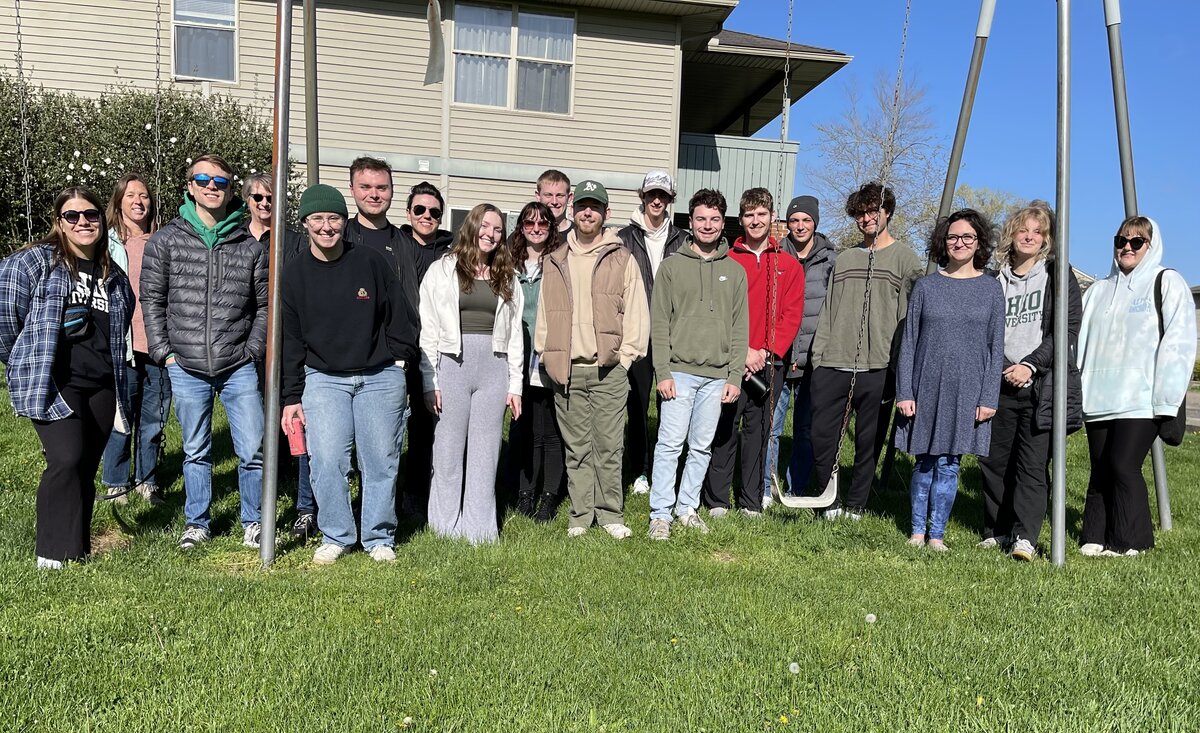
Students at the Chauncey Creekside Apartments.
A Community-Centered Approach to Understanding Poverty
In Paxton's Economics of Poverty class, students don’t just read about inequality—they experience it firsthand. The course partners with various local organizations, including GoodWorks, to provide students with opportunities to immerse themselves in the regional community, one of the poorest regions in Ohio. While in the course, students engage with local organizations addressing key issues such as food insecurity, housing and access to education, gaining practical experience while simultaneously learning about the economic forces at play.
“What I find most valuable about these partnerships is that students get to see the people behind the statistics,” Paxton explained. “It’s about breaking down stereotypes. When students interact with community members, they see them as individuals facing difficult circumstances, not just as numbers on a page.”
Paxton’s students complete 20 hours of service-learning, engaging in various community projects that support local nonprofits while gaining critical insights into the systemic nature of poverty. The experience is designed to be mutually beneficial, allowing students to contribute to the community while learning valuable lessons about inequality and economic structures. For many, the experience shifts their understanding of poverty from an abstract concept to a human reality.
“In Athens, we have lessons to learn right here,” Paxton said. “As one of the poorest counties in Ohio, Athens faces many issues related to poverty and inequality, but we also have a vibrant nonprofit sector that is actively applying cutting-edge techniques and strategies to address these issues. I thought it would be valuable to tap into that local experience as part of my Economics and Poverty class.”
According to Paxton, the nonprofit sector has been incredibly welcoming, offering numerous opportunities for partnership, however, she ensures that the work they are doing does not overburden already stretched organizations but instead works together on projects that contributes meaningfully to the community.
“The goal of these partnerships is for students to gain real, hands-on experience without taking away valuable time and resources from the nonprofits we work with,” Paxton said. “Students engage in a variety of projects that help these organizations, and they get to see firsthand the impact of the work being done in our community.”
Paxton explains that a key aspect of the class is to ensure that the portrayal of poverty is handled carefully, striving to avoid portraying people living in poverty as “learning about poverty” or as mere subjects for study.
“It’s important to make the experience respectful and humanizing,” she said. “We are mindful of not making these communities feel studied or objectified, but rather as places where students can connect and learn deeply. It’s not just about what we can give; it’s about what both sides can learn from each other.”
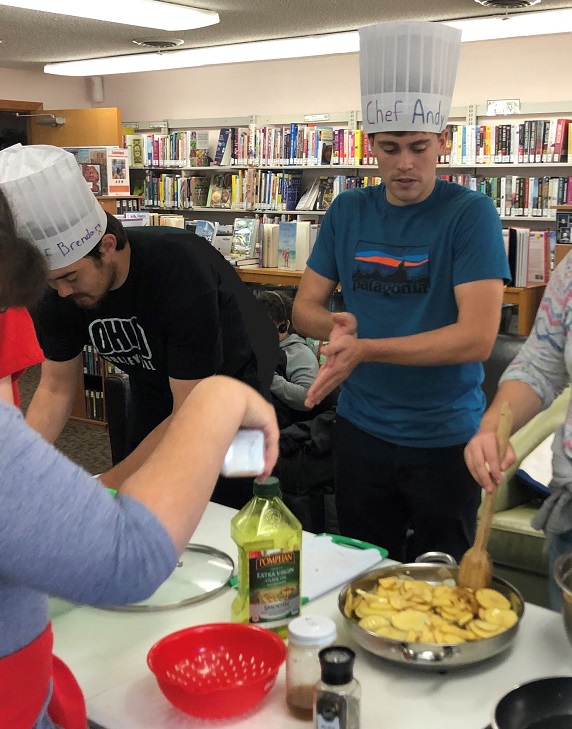
Students volunteer at a local library.
The Altruism Class: Giving Back to the Community
In addition to her work with the Economics of Poverty class, Paxton also teaches an Economics of Altruism course where students explore the principles of effective philanthropy. One of the most unique aspects of this course, which she has been teaching for 10 years, is its emphasis on direct action: students are tasked with distributing real grant money to local nonprofits. Over the years, the class has awarded more than $150,000 in grants to organizations addressing critical social issues like youth mental health, food insecurity, and education.
“The altruism class allows students to apply the theories of philanthropy they learn in class to real-world problems,” Paxton explained. “By evaluating nonprofits and giving away funds, students not only learn about philanthropy, but they also get hands-on experience in making a tangible difference in their community.”
In the most recent semester, the class focused on supporting local nonprofits working on youth mental health in partnership with the Joe Burrow Foundation. Students researched organizations, conducted in-depth analyses and selected the most impactful projects to fund. For Paxton, this process teaches students the importance of thoughtful, strategic giving—and it also prepares them to become active, engaged citizens who are ready to address societal challenges.
“By allowing students to directly contribute to solving local issues, we are not only teaching them about philanthropy, but we are also preparing them to think critically about the world around them and the ways they can make a difference,” she said.
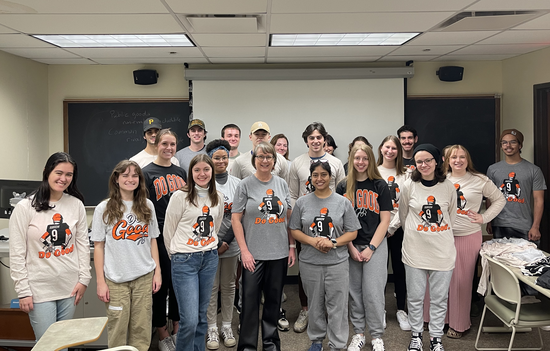
Students pose with Joe Burrow Foundation shirts in the Economics of Altruism class.
The Future of Service Learning
With her Fulbright Award, Paxton is most looking forward to learning new pedagogical strategies that will allow her to incorporate global perspectives into her teaching even more effectively. She hopes the collaboration with Queen’s University will continue beyond this single course, potentially growing into a long-term relationship that will benefit both institutions.
“I’m passionate about expanding the reach of these courses,” Paxton said. “The Center for Community Engagement is now helping more faculty implement service-learning, and I’m excited to see how this model can grow and benefit more students.”

